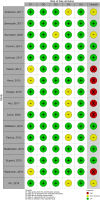Virtual reality simulation-the future of orthopaedic training? A systematic review and narrative analysis
- PMID: 33441190
- PMCID: PMC7807709
- DOI: 10.1186/s41077-020-00153-x
Virtual reality simulation-the future of orthopaedic training? A systematic review and narrative analysis
Abstract
Background: Virtual reality (VR) simulation provides users with an immersive, 3D experience that can be used to allow surgical trainees to practice skills and operations in a safe yet realistic environment. The field of orthopaedics is yet to include VR in core teaching, despite its advantages as a teaching aid, particularly against current simulation tools. This study aims to conduct a systematic review to investigate the efficacy of VR in orthopaedic training, against current methods.
Methods: A systemic review of databases Medline, Embase and the Cochrane Library for randomized controlled trials focusing on VR training against conventional training in orthopaedic surgery was performed. Data synthesis was performed through narrative analysis due to the heterogeneous nature of the data.
Results: A total of 16 studies from 140 titles were identified, across 6 specialty areas. Four hundred and thirty-one participants were included. Control groups included VR, cadaver and benchtop simulators. Forty-seven outcomes were measured, focusing on skill and proficiency assessment. No outcomes focused on patient safety. Although significance between intervention and control was not always achieved, most studies found that the intervention outperformed the control.
Conclusion: VR provides a modern and immersive teaching tool that can develop skills and give confidence to trainees. This study demonstrates the potential for VR simulation as a training aid in orthopaedics and encourages its use alongside conventional teaching methods. However, long-term analysis of the results of VR training on surgical trainees has yet to be conducted. To provide conclusive justification for its inclusion in surgical training, this study recommends that future research follows trainees using VR into the operating room, to determine that VR teaches skills that are transferable onto actual surgeries, subsequently leading to better patient outcomes.
Keywords: Education; Orthopaedics; Simulation; Surgery; Training; Virtual reality.
Conflict of interest statement
The author declares that she has no competing interests.
Figures
References
-
- Training Standards Committee of the British Orthopaedic Association . Specialist training in trauma and orthopaedics. London: GMC; 2018.
-
- Brooks F. Grasping reality through illusion---interactive graphics serving science. Proceedings of the SIGCHI conference on Human factors in computing systems - CHI '88. 1988. pp. 1–11.
LinkOut - more resources
Full Text Sources
Other Literature Sources



